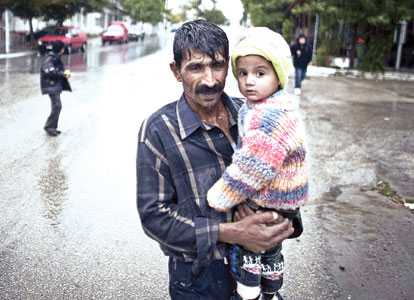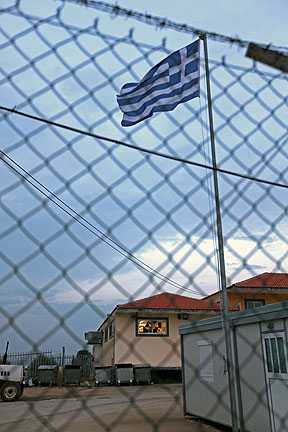The EU border agency Frontex is now actively helping Greece stem the flood of illegal immigrants trying to cross into the country from Turkey. SETimes correspondent Alexander Christie-Miller spoke to several young men willing to risk their lives to get here.
By Alexander Christie-Miller for Southeast European Times in Istanbul and Nea Vissa — 22/11/10
”]![The detention centre on the Greek side of the border. [Alexander Christie-Miller/SETimes] The detention centre on the Greek side of the border. [Alexander Christie-Miller/SETimes]](https://www.turkishnews.com/en/content/wp-content/uploads/2010/11/greekborder.jpg) Sipping a cup of tea in Istanbul’s suburb of Aksaray, Gibril, a 19-year-old migrant from Darfur, shares his dream of Europe.
Sipping a cup of tea in Istanbul’s suburb of Aksaray, Gibril, a 19-year-old migrant from Darfur, shares his dream of Europe.
“There’s a future there,” he says. “I can attend school. There are opportunities for work. If it was up to me, I would go there today.”
Within a week, he hopes to cross Turkey’s land border with Greece. He will put himself at the mercy of people smugglers, and could face minefields and a perilous river crossing. But having been driven from his home and travelling for three months to get here, he sees no other option.
“If I go back to my country, they will kill me,” he says.
Gibril is one of tens of thousands of migrants who have come from across Asia and Africa this year, fleeing poverty, warfare, and persecution to arrive in Istanbul, now the main gateway into the EU.
From here, traffickers take most migrants to the Greek border, where they cross the Evros River, which divides the two countries.
On a single 12.5km stretch of border where the Evros loops into Turkish territory, 31,400 people have been caught crossing illegally from January to September this year alone. Greece accounts for 90% of all detected illegal entries into the EU.
The number of people crossing has surged in recent months because most other routes have been blocked. A treaty signed last year between Italy and Libya has reduced migration across the Mediterranean, and increased patrols through the Greek islands have strangled sea routes.
Humanitarian crisis
Buried on a wooded hilltop in Greece, near the border village of Sidiro, are the bodies of more than 140 migrants. Totally unmarked, this mass grave is the tragic fulfillment of their dream to get to Europe. Most drowned crossing the Evros.
The small rubber boats used by the smugglers are frequently overloaded and prone to capsizing. In July, 13 bodies were washed up on the riverbank; other migrants have been blown up by landmines that still pepper the border.
But even for the vast majority who successfully make it to Greece, the European dream is still a distant one. The pressure of migration is triggering a humanitarian crisis in the debt-laden country.
According to the former head of the Hellenic Migration Policy Institute, Alexandros Zavos, there are between 500,000 and 600,000 illegal migrants in the country.
Some languish in overcrowded detention facilities, but most live in poverty in cities such as Athens, Padros and Thessaloniki. Some inevitably turn to crime.
“I’m afraid that with every day with this economic crisis in Greece, the situation gets harder. It’s very difficult for many people to find a job or a way to live, and on the other hand, many Greek people believe the migrants are destroying their lives,” Zavos says.
In October, the UN sounded the alarm over the state of Greece’s immigration prisons. After a ten-day tour of detention centres, Special Rapporteur on Torture Manfred Nowak described conditions there as “inhuman”.
One former inmate from Sudan told SETimes he had shared an unheated five-by-three-metre cell with 20 other men.
It was the “worst place in the world”, said Housam, 45. “They gave us one sandwich a day and a cup of coffee. There was no exercise. For two months I remained inside. The only time I saw sunlight was when they took me out to take my fingerprints.”
Late last month, when up to 350 people were crossing the border daily around the Greek villages of Nea Vissa and Kastanies, Athens appealed to the EU for assistance.
“The increasing pressure of illegal migration flows on Greek borders is a clearly European problem that demands a European solution,” said Home Affairs Minister Christos Papoutsis.
The response of Frontex, EU’s border agency, was to activate — for the first time — an emergency patrol force created in 2007, drawn from the domestic border police of member countries.
The EU steps in
On November 2nd, a 175-member force of Rapid Border Intervention Teams (RABITs) descended on the Greek side of the border with Turkey for a two-month operation. They brought sniffer dogs, night vision equipment, police vehicles and helicopters.
What they can’t do is turn back a single migrant.
“If they’re in our area, we have a responsibility to accept them,” said Zavos. “They have destroyed their documents. They lie about their country of origin, and the Turkish government doesn’t accept them back.”
Residents in the border village of Nea Vissa are used to seeing migrants gathering at the village train station in large groups, waiting to be picked up by the police.
“[The Frontex deployment] doesn’t make any difference,” said one elderly man sitting outside a cafe on the main street.
Walking along a road outside the village, three Somali migrants asked: “Where can we find the police?” No sooner had they spoken, than a van pulled up, two officers emerged and ushered them into the back.
After being arrested, migrants are taken to detention centres, where they are normally held for two or three days. On their release they are given a paper ordering them to leave the country within 30 days by any legal means.
It is a directive that is impossible to enforce, and few obey. One group of newly-released Afghan migrants laughed at the suggestion of leaving.
“We’ve walked two months to come to Europe and now we’d think to go back? How is this possible?” said Aziz, 21, as he sat with four friends at the bus station in Orestiada, waiting to go to Athens. He wants to go to the UK, Italy, or Norway. “I want to work to make money and to continue my education,” he said.
One big detention centre
As most migrants discover, leaving Greece can be far harder than getting in. Under a regulation called Dublin II, adopted by EU member states in 2003, any person applying for asylum must do so in the country where they first entered. Many of those who reach other European destinations are forcibly returned to Greece.
“I never thought I would come back to Alexandroupolis,” said Majid, an Afghan who has lived in the city close to the Turkish border for nine months. He first arrived here more than two years ago. Evading arrest, he went on to Italy and then Austria, where he was eventually caught and sent back.
“I committed a mistake: I said I’d come from Greece,” he recalled ruefully. If he had lied and said he had come straight to Austria, he would have been able to stay there.
“I could have lived with dignity and honour. I could have proper papers and a proper job … All of Greece is a big detention centre; we can’t get out,” he said.
Now pressure is mounting for other EU states to share the load. On his recent visit to Greece, Nowak called for a change to Dublin II. “Greece should not carry the burden of receiving the vast majority of all migrants entering the EU,” he said. “This is a truly European problem which needs a joint European solution.”
Related Articles
US report notes decline in terrorist attacks worldwide
30/08/2010
Diplomatic Diary: Berisha, Papandreou talk ties
28/09/2010
Diplomatic Diary: Ireland to back Macedonia’s EU bid
24/11/2009
Diplomatic Diary: Erdogan, Sargsyan meet in Washington
13/04/2010
International officials praise Cypriot reunification progress
02/04/2010
The Greek government, along with Italy and Malta, is seeking a review of Dublin II. However, a proposal tabled by the EU Commission that would allow member states to suspend the regulation when subject to exceptional migration was blocked by heavyweight member states earlier this month.
Analysts, including Zavos, argue that Ankara’s co-operation is essential to stopping the influx.
“The only solution is to sign an agreement with the Turkish government to accept these illegal migrants when we can prove that they came from Turkey,” he said. A current agreement between Ankara and Athens allows for the return of only 1,000 migrants a year — just 2% of the total.
Renegotiating this is now a priority for both Greece and the EU, and earlier this month, EU Internal Affairs Commissioner Cecilia Malmstrom announced that a deal is close. “It is an issue that we have discussed with the Greek side and is something that will make the situation much easier for Greece,” she said.
This content was commissioned for SETimes.com.





